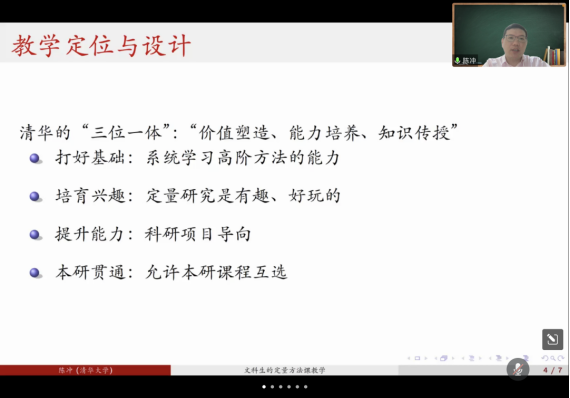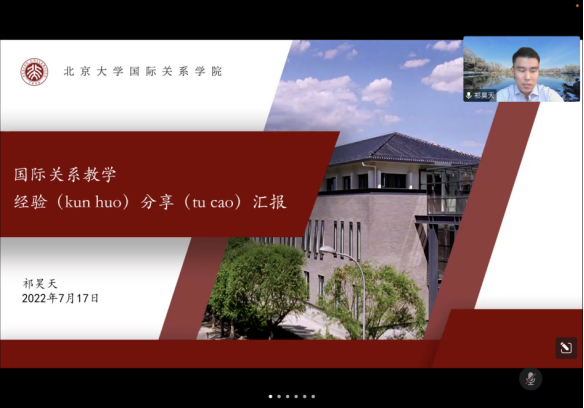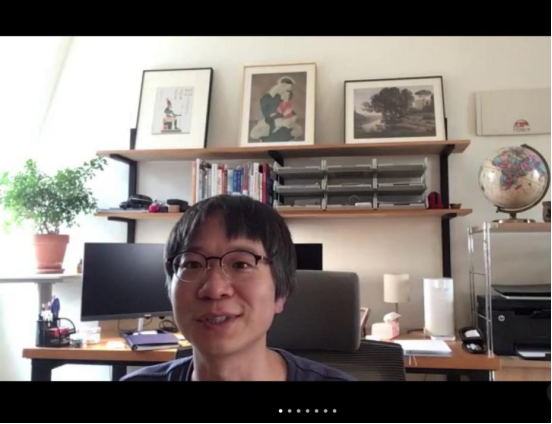On 17 July 2022, teaching salon for young teachers of the "Teaching Workshop" series of Lu Ming Lecture, hosted by the School of Politics and International Relations of Lanzhou University, was successfully held online. Professor Chen Xiaoding, Deputy Dean of School of Politics and International Relations, Lanzhou University, presided over this teaching salon, in which Associate Professor Chen Chong of School of International Relations, Tsinghua University, Assistant Professor Qi Haotian of School of International Relations, Peking University, Lecturer Wang Yaqi of Zhou Enlai School of Government Administration, Nankai University, and Associate Professor Chen Yiyi of School of Politics and International Relations, Lanzhou University, shared their teaching experience and discussed the problems encountered in the teaching process. More than 150 teachers and students from inside and outside the university participated in this event.

Mr. Chen Chong from the School of International Relations, Tsinghua University shared his views on "Teaching Quantitative Methods to Liberal Arts Students". Firstly, Mr. Chen introduced the orientation of the quantitative methods course. He first explained the importance and practicality of quantitative methods in terms of internship, research and study abroad. He then went on to explain how the quantitative statistics class can shape values, develop competencies and impart knowledge in terms of the cultivation of scientific spirit, the use of tools, the promotion of independent research projects and the selection of course materials. Next, Mr. Chen shared the teaching of quantitative methods lessons from the perspective of this research interchange. In specific teaching, Mr. Chen's quantitative methods course system encourages outstanding undergraduate students to take a graduate methods course, while requiring graduate students to take an undergraduate equivalent methods course first.

Mr Qi Haotian from the School of International Relations, Peking University, shared his experience of teaching the subject of international relations. Firstly, Mr. Qi shared the key points and difficulties he encountered in the teaching process from the perspectives of tradition and innovation, theory and history, theory and practice, and the integration of multiple approaches. Secondly, Mr. Qi focused on how to develop students' theoretical thinking in the context of the reading-discussion-writing triad. Finally, Mr. Qi introduced multimedia teaching, English immersion classroom and simulation exercises, hoping to use these methods to enrich the classroom format and cultivate students' motivation.

Mr. Wang Yaqi from the Zhou Enlai School of Government and Management, Nankai University, shared his undergraduate teaching experience. Firstly, in terms of teaching and learning, Mr. Wang believes that it is important to closely integrate theory and reality, and to focus on grasping students' needs in the process of imparting knowledge to them. Secondly, in terms of knowledge and philosophy, Mr. Wang pointed out that students should be cultivated with a sense of mission in the education process, so that they can foresee China and then serve China better.

Mr. Chen Yiyi from the School of Politics and International Relations of Lanzhou University shared his experience in the process of transforming from a PhD student to a university staff. Mr. Chen shared his experience in teaching from three aspects: closely integrating cases around him, controlling the quality and quantity of lessons and developing students' thinking skills. Afterwards, Mr. Chen also gave an outlook on how to balance the ratio of Chinese to English teaching in the future and how to do a good job in online teaching in the context of the COVID-19.
After the four guests had finished their sharing, they had in-depth discussions with the teachers and students in the audience on issues such as mock exercises, teaching in English, guiding students' research, and combining classroom content with current affairs and politics. Finally, Professor Chen Xiaoding summarized the Young Teachers' Teaching Salon.
